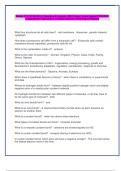Biology 171 UH MANOA | Questions & Answers (100 %Score) Latest Updated 2024/2025
Comprehensive Questions A+ Graded Answers | With Expert Solutions
What four structures do all cells have? - cell membrane , ribosomes , genetic material ,
cytoplasm
How does a prokaryotic cell differ from a eukaryotic cell? - Eukaryotic cells contain
membrane-bound organelles, prokaryotic cells do not
What is the cytoskeleton made of? - proteins
What is the order of taxonomy? - Domain, Kingdom, Phylum, Class, Order, Family,
Genus, Species
What are the characteristics of life? - organization, energy processing, growth and
development, evolutionary adaptation, regulation, reproduction, response to stumulus
What are the three domains? - Bacteria, Archaea, Eukarya
When does a hypothesis become a theory? - when there is consistency in experiments
and data
Where do hydrogen bonds form? - between slightly positive hydrogen atom and slightly
negative atom of a nearby polar covalent molecule
Do hydrogen bonds form between two different types of molecules, or do they have to
be the same type of molecule? - both
What do ionic bonds form? - ions
What is an ionic bond? - A chemical bond that's formed when an atom transfers an
electron to another Atom
What is a covalent bond? - when two atoms share electrons
What types of covalent bonds are there? - nonpolar and polar
What is a nonpolar covalent bond? - electrons are shared equally (ex H2)
What is a polar covalent bond? - unequal sharing of electrons (ex H2O)
In a polar covalent bond, which atom will have a negative charge? - The one that carries
the shared electron more of the time
,What are the emergent properties of water? - cohesive behavior, ability to moderate
temperature, expansion upon freezing (lower density as solid than liquid), versatility as
a solvent
Where are emergent properties of water found? - In a collection of water molecules, not
just an individual water molecule
Why are water molecules cohesive and adhesive? - because they're polar
What is cohesion? - Attraction between molecules of the same substance
What is adhesion? - An attraction between molecules of different substances
What does cohesion cause? - surface tension
What is the specific heat of water? - The amount of energy it takes to increase 1 g of a
substance by 1 °C
What has lower density cold water or warm water? - warm water
Hydrophilic - water loving, dissolves in water
Hydrophobic - water fearing, does not dissolve in water
What are acids? - Hydrogen donors, have low pH
What are bases? - H+(Proton) Acceptors, produce OH-ion, high pH
Buffer - compound that prevents sharp, sudden changes in pH by accepting OH and H
ions
organic chemistry - the study of all chemicals containing carbon
Why is carbon so important? - 4 valence electrons means carbon can form lots of
bonds, and a large variety of complex molecules
structural isomers - Differ in the physical arrangement of the atoms
geometric isomers - have the same covalent arrangements but differ in spatial
arrangements (cis and trans)
Enatiomers - Differ in the arrangement of atoms around an asymmetric carbon
The molecules are mirror images of each other (left/right hand)
Where are the same compounds found on a cis version? - same side
, Where are the same compounds found on a trans version? - opposite sides
Which function group behaves as a base? - amimines
What type of biological macromolecules
are steroids? - lipids
dehydration synthesis - Builds a larger polymer, and produces a water molecule
Hydrolysis Reaction - Breaks a polymer apart, and consumes a water molecule
What are examples of monosaccharides? - glucose, fructose, galactose
What are examples of disaccharides? - maltose, sucrose, lactose
What are examples of polysaccharides? - starch, glycogen, cellulose, fiber
Aldose - carbonyl group located at the end of the carbon skeleton.
Ketose - carbonyl group in middle of carbon chain
How are disaccharides formed? - dehydration synthesis
Where is energy stored in plants? - starch
Where is energy stored in animals? - glycogen
Cellulose - A substance (made of sugars) that is common in the cell walls of many
organisms, structural polyssacharide
Chitin - structural polysaccharide in arthropods and fungi
What do polymers that contain sugars do? - they may:
store hereditary info
store energy
protect the cell
Are lipids hydrophobic or hydrophilic? - hydrophobic
What are examples of lipids? - fats, oils, waxes, steroids, phospholipids
saturated fats - solid at room temperature, no double bonds (usually animal fats)
unsaturated fats - liquid at room temperature, double bonds (usually plant and fish fats)
Phospolipids - Formed by two molecules of fatty acids, phosphate and glycerol




